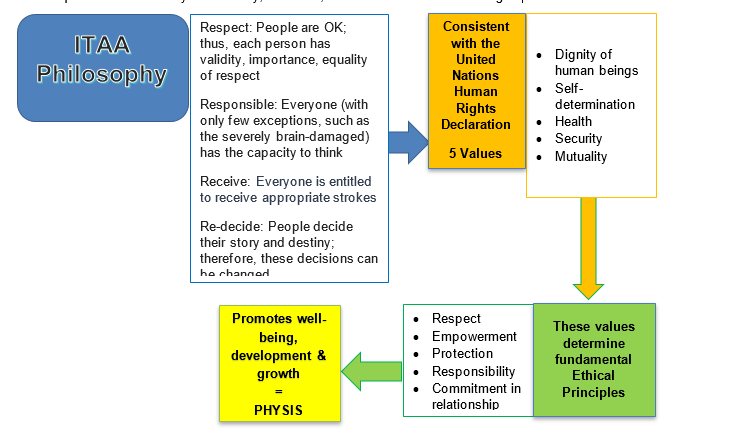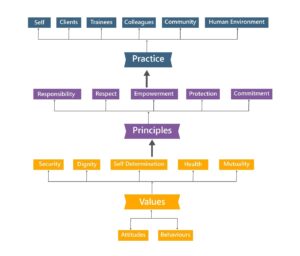SYNTHESIS OF THE ITAA ETHICAL PRINCIPLES
The ITAA has adopted the TA philosophy and combined this with the United Nations Human Rights Declaration. This gives us the basis on which we build an ethical framework for all 4 specialisation fields of TA: Counselling, Education, Organisations, and Psychotherapy. Figure 1 Synthesis of the Ethics Principles below describes the relationship between the ITAA’s philosophy, the UN Human Rights Declaration, values, Ethical Principles, behaviours and physis.

A full description of the United Nations Human Right declaration can be found in Articles of the Universal Declaration of Human Rights related to basic values: in the EDUCATIONAL APPENDICES.
ITAA PHILOSOPHY
The ITAA adopts the following philosophical presuppositions:
VALUES, PRINCIPLES AND PRACTICE

The above figure shows how Values inform our attitudes and behaviours. These values then inform the Principles on which we live our lives, professionally as well as personally, and then how both the Values and Principles then play out in the way we work and live.
Ethical Values are the fundamental basis on which human beings promote their personal and professional development and fulfilment as well as those of others. Values include reference to natural law that informs how people behave with the best interests in mind, of self, others, and larger systems.
Our values are displayed in our attitudes and behaviours. Those values are lived out in the Principles by which we live (our Practice). Our Practice impacts on the various affected groups (Self, Clients, Trainees, Colleagues, Community and the Human Environment).
The following identified values are related to human rights and are included in the Universal Declaration of Human Rights: Dignity, Self Determination, Health, Security and Protection. This frame of reference is congruent with the existential and philosophical perspectives of transactional analysis. (LINK to Synthesis of Ethical Values and Principles from the EATA Ethics Manual and the United Nations Declaration of Human Rights for the detailed information).
PRINCIPLES OF THE CODE OF ETHICS
Practitioners and members have a professional responsibility to the ITAA, its members, clients and the public to integrate and behave in line with the ITAA’s Philosophy and Guidelines for Ethical Practice. This establishes a social contract inviting the public’s trust.
The ITAA Ethical Principles are:
- Respect
- Empowerment
- Protection
- Responsibility
- Commitment in relationship
When a Practitioner’s behaviour is not aligned with the ITAA ethical principles, those who are aware of the behaviour in question have an ethical obligation to address it appropriately. The process to address an ethical concern (Section 3) proposes the first option is to address the member directly.
BEHAVIOURS RELATING TO THE ETHICAL PRINCIPLES

